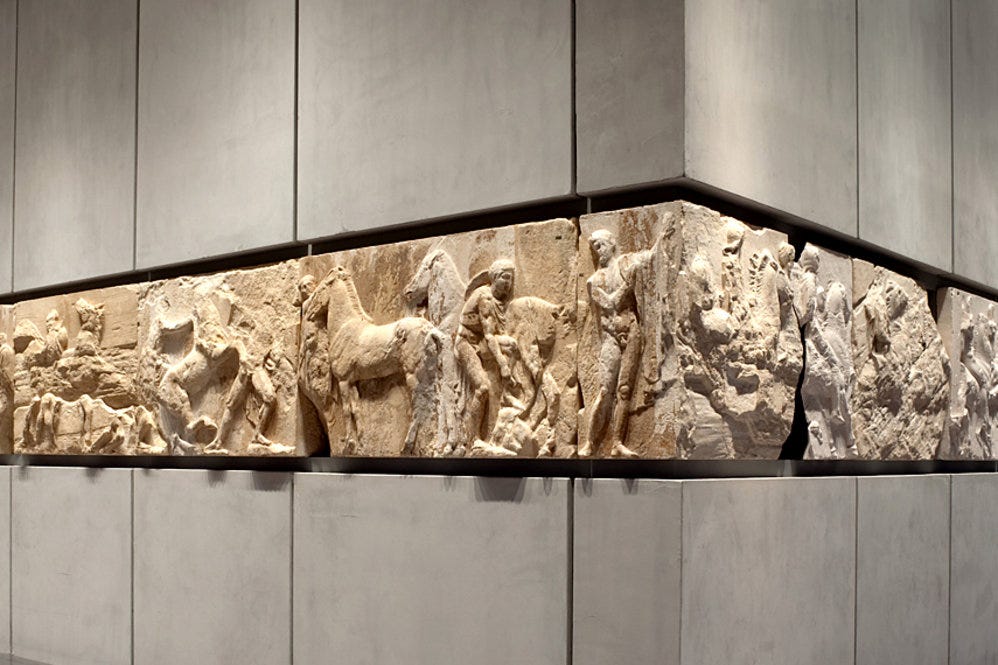Giving back what we stole? It's all Greek to me.
When the Greek Prime Minister refused to abandon his position about returning the Parthenon Marbles, Sunak lost his. The problem is Britain has a similar issue with a number of other countries.
Two weeks ago, Rishi Sunak prepared to meet his Greek counterpart, the freshly re-elected, Kyriakos Mitsotakis. But rather than enjoy a cuppa with gyros, the two refused to speak to each other after falling out over a few rocks. To Mr. Mitsotakis those rocks are pretty important. His nation's history is quite attached to the Parthenon and the marble sculptures that used to wrap around it. The British Museum where those Greek rocks are kept have a different kind of attachment to them. Originally because they were forced to buy them off a well-connected guy called Elgin for £30k by the British Parliament and then because, well they sell a lot of tickets.
Why does Sunak care so much? Maybe its because if he didn’t, we might find Britain without many artefacts. And they sell a lot of tickets. Kind of the prototype of dine out to help out.

To begin properly. What are the Parthenon Marbles and why do they matter enough to cause a diplomatic incident and the most biting one liner in Parliament since Dennis Skinner was getting kicked out of the house on a bimonthly basis? The Marbles, known in the UK as the Elgin Marbles, totally not so we can ignore they are Greek, are named for the man who ‘collected them’ - which might be a slightly generous term.
The sculptures were part of the walls of the ancient Parthenon. The collection process occurred in the early 19th century, and involved only the most buttoned up of archaeological process: they were sawn off the building, then snuck away to Malta for a few years before heading back to the UK - apparently for safe-keeping from those neglectful Ottomans and that kleptomaniac, Napoleon.
The debate between the UK and Greece over who should have the marbles has been ongoing literally the entire time Greece has existed. In 1835, soon after their independence was secured, the Greek government requested Britain return their stuff. After being told to not worry about it for about 150 years, Greece escalated the situation into a formal complaint, and then tattled on the UK to UNESCO.
Since then, the issue has been a diplomatic sore point between the UK and Greece, one largely plastered over by the fact that they were both members of the EU, making it more explicable that cultural items might be shared, and access would be fairly simple and open - without borders. Right? Oh… wait.
It is fair to ask if this is a mere, slightly extended storm in a small Wedgewood cup. On the scale of things war, famine, cost of living, does it really matter if a few million barbecue obsessed Europeans are mad at the UK? Is this backward and forward with Greece about a few stray stones really that important?
The wider issue is that it might not just be the Greeks that the Brits have upset like this. Ah, the Empire….
This antique ‘can’ might have a few more worms than at first it seems. Nigeria has requested that their essential cultural artefacts, the Benin Bronzes, be returned. Egypt has long requested that the UK give back one of their most famous artefacts, the Rosetta stone, when presumably they should just remain thankful they have all their Pyramids intact. Sudan has requested that artefacts taken from the Battle of Omdurman be returned, so that they might tell the story of that colonial battle with Britain properly in their own museums.
Most frighteningly perhaps, China has publicly called on museums throughout Europe to return the looted pieces from the Summer Palace, many of which reside in the UK, and more importantly were looted by, apparently, a few erstwhile Brits.
Unfortunately the looting didn’t stop with magnificent cultural artifacts. Thanks to a minor 19th century British upper class fascination with Brit-superpower, it seems the British Empire also had a thing for collecting dead people… dead people with descendants who, it seems, would rather their ancestors were buried properly, and not under a tonne of bureaucratic paperwork in London.
Egypt (them again), has often mentioned the presence of mummies in the UK, while New Zealand on behalf of various Maori communities has requested the repatriation of several Maori heads?? Numerous Australian Aborigine people have come here specifically to get their ancestor’s bones back. What all these people have though learnt is that if the UK has your stuff, you might not get it back, but you can, at least, pay to see it.
And if the UK has your great great Grandad, feel free to come and say goodbye so long as you cough up the price of a museum ticket.
A number of people might feel that this is an unfair report of the UK’s cultural situation. For one thing, finders keepers, but for another, how do we even know these places aren’t exaggerating their ties to such things? Well, perhaps the fact that most of these pieces have little signs next to them saying they’re from such a place, and of such people, and have a little synopsis about how important they are to that culture. There is also the small fact that even the British Museum can’t ignore the numerous calls, and recently entered negotiations to repatriate a few items, they also have an entire part of their website dedicated to their “contested collection”. Not wanting to worry anyone, but that doesn’t seem to be a great approach to claiming innocence??
What might make some folk feel better, is that while a post-Brexit Britain strives to establish its place in the world, this repatriation issue is helping put the UK in a similar spot as the United States! Just like the UK, the US benefited from being a reasonably stable, not actively colonised state during the 19th and early 20th century, and so has a whole bunch of stuff it is currently being asked to give back.
Recently a few slightly footloose and fancy free Americans were in trouble for owning artwork by Egon Schiele looted by Nazis in their museums. This is quite a common issue for US cultural institutions. It turns out a good few of their collections have pieces looted in the period 1933-1945 by Nazi Germans, which have since been repatriated and sent back to their rightful owners on discovery.
Perhaps that’s how Britain has bested the US: If you do the ‘collecting’ yourself, and keep at it for over 100 years instead of 12, you get to make a pretty strong case that the stuff is actually better off staying with you!

There was a sense, amongst many, that while the standoff over the Parthenon Marbles was more than embarrassing for Sunak, in the end the repatriation debate is silly squabbling that doesn’t really matter. The problem is that in the real world people have connections to the cultural items that make up their history. Rapa Nui people, requesting the return of their Easter Island heads, described the situation as “England people have our soul.”
We might not be thinking purely out of the goodness of our soul, but as we have made the recent choice to detach ourselves from the world’s second largest economic block, we might need to make somewhat more pragmatic and god forbid even diplomatic choices if we expect other nations to engage with us on our own. At the very least it might behove us not to slam the proverbial door in their face.
Keep up to date with The Letts Journal’s latest news stories and updates at our website and on twitter.





